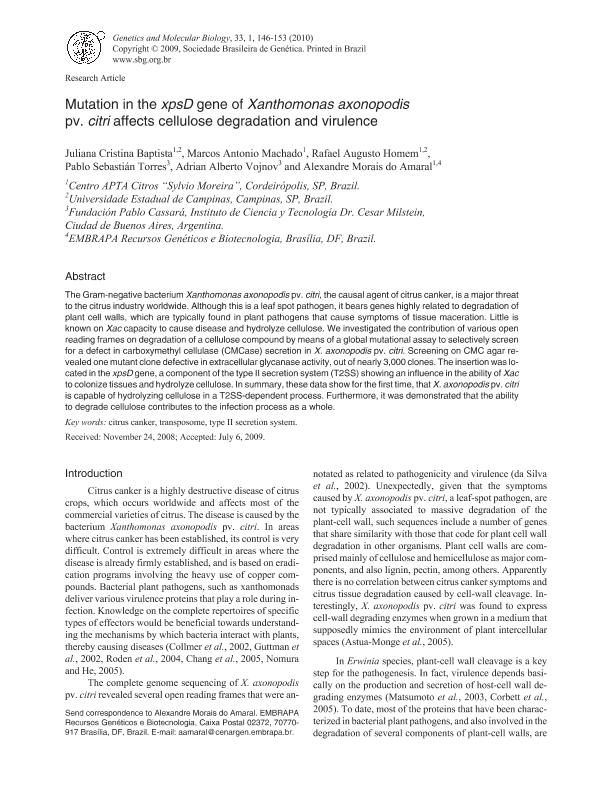Artículo
Mutation in the xpsD gene of Xanthomonas axonopodis pv. citri affects cellulose degradation and virulence
Baptista, Juliana Cristina; Machado, Marcos Antonio; Homem, Rafael Augusto; Torres, Pablo Sebastian ; Vojnov, Adrián Alberto
; Vojnov, Adrián Alberto ; do Amaral, Alexandre Morais
; do Amaral, Alexandre Morais
 ; Vojnov, Adrián Alberto
; Vojnov, Adrián Alberto ; do Amaral, Alexandre Morais
; do Amaral, Alexandre Morais
Fecha de publicación:
03/2010
Editorial:
Sociedade Brasileira de Genética
Revista:
Genetics and Molecular Biology
ISSN:
1415-4757
e-ISSN:
1678-4685
Idioma:
Inglés
Tipo de recurso:
Artículo publicado
Clasificación temática:
Resumen
The Gram-negative bacterium Xanthomonas axonopodispv. citri, the causal agent of citrus canker, is a major threat to the citrus industry worldwide. Although this is a leaf spot pathogen, it bears genes highly related to degradation of plant cell walls, which are typically found in plant pathogens that cause symptoms of tissue maceration. Little is known on Xaccapacity to cause disease and hydrolyze cellulose. We investigated the contribution of various open reading frames on degradation of a cellulose compound by means of a global mutational assay to selectively screen for a defect in carboxymethyl cellulase (CMCase) secretion in X. axonopodispv. citri. Screening on CMC agar revealed one mutant clone defective in extracellular glycanase activity, out of nearly 3,000 clones. The insertion was located in the xpsDgene, a component of the type II secretion system (T2SS) showing an influence in the ability of Xac to colonize tissues and hydrolyze cellulose. In summary, these data show for the first time, that X. axonopodispv. citri is capable of hydrolyzing cellulose in a T2SS-dependent process. Furthermore, it was demonstrated that the ability to degrade cellulose contributes to the infection process as a whole.
Palabras clave:
Citrus Canker
,
Transposome
,
Type Ii Secretion System
Archivos asociados
Licencia
Identificadores
Colecciones
Articulos(ICT - MILSTEIN)
Articulos de INST.DE CS. Y TECNOLOGIA "DR. CESAR MILSTEIN"
Articulos de INST.DE CS. Y TECNOLOGIA "DR. CESAR MILSTEIN"
Citación
Baptista, Juliana Cristina; Machado, Marcos Antonio; Homem, Rafael Augusto; Torres, Pablo Sebastian; Vojnov, Adrián Alberto; et al.; Mutation in the xpsD gene of Xanthomonas axonopodis pv. citri affects cellulose degradation and virulence; Sociedade Brasileira de Genética; Genetics and Molecular Biology; 33; 1; 3-2010; 146-153
Compartir
Altmétricas



